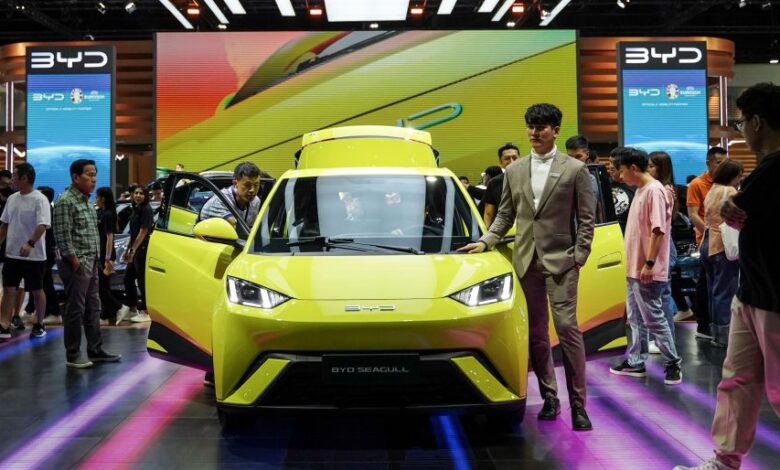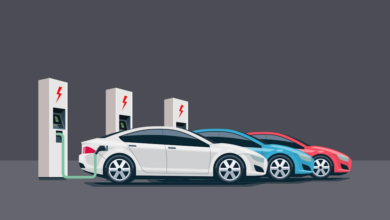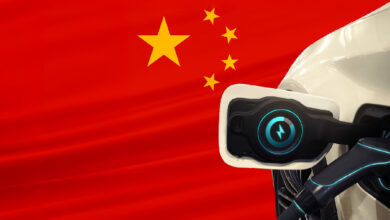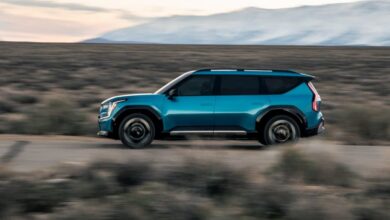Biden Administration Quadruples-Down on Chinese EV Import Tariffs

- The Biden administration has announced a 100% tariff on the importation of Chinese electric vehicles—effectively quadrupling that established by the Trump administration.
- Rates on lithium-ion EV batteries also grow, from 7.5% currently to 25% this year, as do the tariffs on a host of other automotive-related goods and materials.
- The question remains whether a 100% tariff can keep Chinese automakers from “dumping” cheap EVs into our market—especially given the imminent production of the Shark crew cab pickup in Mexico, which would not be subject to the same import tariffs.
The Biden administration is quadrupling down on former President Trump’s Chinese electric vehicle tariffs with a 100% rate to take effect this year.
The Trump administration had imposed a 25% tariff on Chinese-export EVs that—combined with the Biden administration’s tax breaks of up to $7,500 for North American-built EVs—has proven at least as effective in restricting low-priced foreign EVs as the 25% “Chicken Tax” has in keeping import pickup trucks from invading the US for 60 years.
The new tariff rates the White House announced Tuesday also increase the rate on lithium-ion EV batteries from 7.5% currently, to 25% this year.
Can a 100% tariff keep Chinese automakers from “dumping” cheap EVs into our market?
There has been a lot of mostly positive buzz in recent weeks over the BYD Seagull, a small EV hatchback that starts about $12,000 in China. Even at $24,000-$25,000, the Seagull could grab a serious portion of the low-end of our market, though it would not be eligible for the $7,500 tax incentive.
BYD had scheduled for 12:30 p.m. Eastern time Tuesday the global unveiling from Mexico City of its Shark crew cab pickup truck. As Mexico is a trade partner with the US and Canada, likely production of the BYD Shark there would not be subject to these new tariff rates.
President Biden is taking “action to protect American workers and businesses from China’s unfair trade practices,” according to Tuesday’s White House announcement, which outlines higher tariffs to be imposed on myriad imported products.
“President Biden is directing his trade representative to increase tariffs under Section 301 of the Trade Act of 1974 on $18 billion of imports from China to protect American workers and businesses,” according to the White House release.
With this singular issue, Biden is not only maintaining Trump administration’s foreign trade policies, he is supercharging them.
But it would seem unlikely a possible second Trump administration might reverse Biden’s new tariff rates. GOP candidate Donald Trump has made it clear his second administration would reverse all of Biden’s infrastructure program and Inflation Reduction Act policies related to cutting carbon emissions, including the EV tax incentives and subsidizing of recharging infrastructure.
Green car advocates worry that such a Trump reversal would hand the EV market and development over to Chinese automakers, and that Detroit automakers would quickly fall behind. It seems unlikely a second Trump administration would move quickly, or at all, to reverse higher Chinese tariffs.
A number of those other products and industries facing tariff rate increases are related to auto and EV production:
•Steel and aluminum: Rate increase from 0%-7.5% currently to 25% this year.
•Semiconductors: Increase from 25% currently to 50% by 2025.
•Critical minerals: From 0% currently to 25% this year.
•Batteries, battery components and parts, and critical minerals: In addition to the immediate increase in the rate for Li-Ion EV batteries to 25%, the rate for natural graphite permanent magnets goes up from 0% currently to 25% in 2026, and the rate for non-EV Li-Ion batteries increases from 7.5% to 25% in 2026.
•Solar cells: Whether or not assembled into modules, the rate increases from 25% currently to 50% this year.
There is also a new 25% rate this year, from 0%, for ship-to-shore cranes and various increases for certain medical products.



